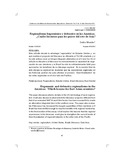| dc.rights.license | http://creativecommons.org/licenses/by-nc-sa/3.0/ve/ | |
| dc.contributor.author | Morales, Isidro | |
| dc.date.accessioned | 2011-11-21T19:03:59Z | |
| dc.date.available | 2011-11-21T19:03:59Z | |
| dc.date.issued | 2011-11-21T19:03:59Z | |
| dc.identifier.issn | 1856-349X | es_VE |
| dc.identifier.uri | http://www.saber.ula.ve/handle/123456789/34113 | |
| dc.description.abstract | Este artículo discute la estrategia “regionalista” de Estados Unidos y en
qué medida el proyecto del Mercosur es diferente al TLCAN ampliado y si
ha sido exitoso crear un bloque integrado alternativo en el Cono Sur. En el
artículo se discute si el Mercosur ha incrementando la capacidad de negociación
de sus miembros y si Brasil ha sido lo suficientemente hábil para
aprovechar los beneficios de su liderazgo regional. En la sección final de
este ensayo se exploran las lecciones que las experiencias regionales en
las Américas podrían dar para afianzar el proceso “East-Asiatization” de
las redes regionales en el otro lado del Pacífico. | es_VE |
| dc.language.iso | es | es_VE |
| dc.rights | info:eu-repo/semantics/openAccess | |
| dc.subject | Regionalismo | es_VE |
| dc.subject | Estados Unidos | es_VE |
| dc.subject | Brasil | es_VE |
| dc.subject | Mercosur | es_VE |
| dc.subject | Asia Oriental | es_VE |
| dc.title | Regionalismo hegemónico y defensivo en las Américas. ¿Cuáles lecciones para los países del este de Asia? | es_VE |
| dc.title.alternative | Hegemonic and defensive regionalisms in the Americas. Which lessons for East Asian countries? | es_VE |
| dc.type | info:eu-repo/semantics/article | |
| dc.description.abstract1 | This paper discusses what is at stake in the US-led strategy of open regionalism.
It will also discuss to what extent the Mercosur project is different from
that of an extended NAFTA and if the former has been successful to create
an alternative integrated bloc in the southern cone. The paper also evaluates
if Mercosur has increased the bargain capabilities of their members or if
Brazil has been skillful enough to reap the benefits of its regional leadership.
In the final section of this essay I shall explore the lessons that the regional
experiences in the Americas could give to strengthen the current trends of
East-Asianization of regional networks in the other side of the Pacific. | es_VE |
| dc.description.colacion | 47-84 | es_VE |
| dc.description.email | isidro.morales@itesm.mx | es_VE |
| dc.identifier.depositolegal | 07620053303358 | es_VE |
| dc.subject.centroinvestigacion | Centro de Estudios de Fronteras e Integración (CEFI) | es_VE |
| dc.subject.facultad | Núcleo Táchira (NUTULA) | es_VE |
| dc.subject.keywords | Regionalism | es_VE |
| dc.subject.keywords | United States | es_VE |
| dc.subject.keywords | Brazil | es_VE |
| dc.subject.keywords | East Asia | es_VE |
| dc.subject.seccion | Cuadernos sobre Relaciones Internacionales, Regionalismo y Desarrollo: Artículos | es_VE |
| dc.subject.thematiccategory | Ciencias Económicas y Sociales | es_VE |
| dc.subject.thematiccategory | Ciencias Jurídicas y Políticas | es_VE |
| dc.subject.tipo | Revistas | es_VE |
| dc.type.media | Texto | es_VE |


